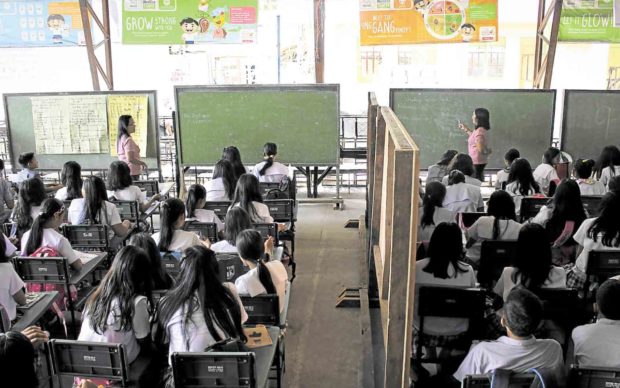
FILE PHOTO: This photo shows Filipino high school students in makeshift classrooms. Some changes in the K-12 curriculum of the Department of Education (DepEd) are being considered to improve the employability of senior high school (SHS) graduates, according to President Ferdinand Marcos Jr. (MICHAEL B. JAUCIAN / Philippine Daily Inquirer)
MANILA, Philippines — President Ferdinand Marcos Jr. on Friday said several changes in the K-12 curriculum of the Department of Education (DepEd) are being considered to improve the employability of senior high school (SHS) graduates.
According to Marcos, the K-12 curriculum failed to increase the employability of SHS graduates when it was the ultimate goal for its implementation.
“Ginawa natin ‘yung K-12 dahil hinahanap ang years of training sa ating mga nag-apply at sinasabi dito sa Pilipinas, kulang dahil 10 years … that was the reason we did it para employable ‘yung mga graduate natin,” Marcos noted during a chance interview in Sulu on Friday.
(We did the K-12 because the years of training are being sought from our applicants and they say that here in the Philippines, it is not enough because we only have 10 years… that was the reason we implemented it so that our graduates are employable.)
READ: A decade of tweaking, rethinking: Looking back at K-12 program
“Pero kung titignan natin ang naging resulta, hindi tumaas, hindi gumanda ang employability nila. So we have to do something else,” he added.
(But if we look at the result, their employability did not increase, did not improve. So we have to do something else.)
Marcos said he and incoming Education Secretary Sonny Angara had talked about implementing some changes to the current K-12 curriculum shortly after the Palace announced the senator’s designation to the Cabinet post.
Among these changes, he said, were the possible introduction of “mini courses” spanning from three months to a year to allow senior high school graduates to specialize in specific areas in a bid to attract employers.
Marcos also said the government intends to coordinate with the private sector to determine and “guarantee the supply of skilled workers” needed in their respective industries.
READ: Marcos orders more focus on PH history education
Marcos likewise disclosed that the DepEd is aiming to improve the quality of STEM (Science, Technology, Engineering, and Mathematics) subjects based on the results of international objective tests, which showed that the Philippines is lagging behind.
“We will also simplify the curriculum. We go back to make sure that everybody understands the basics,” the President said.
Marcos further revealed that he emphasized to Angara the importance of teacher’s welfare – to allow them to concentrate on actual teaching, as well as the need for them to be “retrained” due to the rapid development of technology.
“Because ang bilis ng development lalo sa technology na within one to two years obsolete na. Kailangan turuan natin ulit. So that’s what we will do. We will beef up that part of it,” he said.
(Because development is fast, especially in technology, that within one to two years it becomes obsolete. We need to teach them again. So that’s what we will do. We will beef up that part of it.)
Feeding programs in schools are also being planned to address malnutrition and stunting among Filipino students, Marcos added.